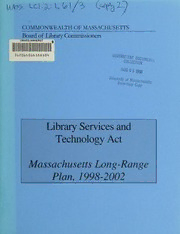Table Of ContentCOMMONWEALTH OF MASSACHUSETTS
Board of Library Commissioners
UMASS/AMHERST
I II
315Dfc.b01t.5flfllDM
MGO
3 1998
'ty of
Massachusett"s
Depository Copy S
Library Services and
Technology Act
Massachusetts Long-Range
1998-2002
Plan,
MASSACHUSETTS BOARD OF LIBRARY COMMISIONERS
Library Services and Technology Act
Massachusetts Long-Range
Plan,
1998-2002
Massachusetts Board ofLibrary Commissioners
MA
648 Beacon Street • Boston, 02215
Phone 617 267-9400 or 1-800-952-7403
Fax 617 421-9833
www.mlin.lib.ma.us
August 1997
The activity which is the subject ofthis document was supported in whole or in part bv the US
Department ofEducation and the Institute ofMuseum and Library Services. \ [owever, the
opinions expressed herein do not necessarily reflect the position or policy ofeither agency, and
no official endorsement bv either aeencv should be inferred.
Digitized by the Internet Archive
2014
in
https://archive.org/details/libraryservicestOOmass
Table of Contents
Preface iv
Background/Introduction
1
Needs Assessment 12
Mission Statement 17
Goals And Objectives 17
Timeline 23
Priorities, Policies, Procedures, Evaluation 25
Appendices:
A: Eligibility Requirements For Participation
As A Member OfA Regional Library System 31
B: Long-Range Plans 32
C: Acronyms And Abbreviations 34
Preface
This Massachusetts hong-Range Plan, 1998-2002 (LRP) has been developed to set broad
strategic direction for the use of Library Services and Technology Act (LSTA) funds,
to inform Massachusetts libraries of these directions, and to meet the statutory
requirement. The plan will be filed with the Institute of Museum and Library
Services, the federal agencywith oversight responsibility forLSTA.
In developing this plan, the staffofthe MBLC's Library Development Unit worked
closely with a Long-Range Plan Steering Committee appointed by the Board of
Library Commissioners and the State Advisory Council on Libraries. The plan is
A
based on the LSTA legislation, the MBLC's Strategic Planfor the Future ofLibrary
Services in Massachusetts, and input from librarians and library users and non-users
gained through a series ofprofessionally moderated focusgroups.
This LRP differs from the previous LSCA Long-Range Program in several important
ways:
-programs are to be available to alllibraries
-objectives are specific and intended for completionwithin the five-yearplan
-evaluation ofthe impact ofthe program on users is stressed
-new emphasis is placed on statewide programs, including programs for which no
grant application is required
-targeted programs, mini-grants and institutes are a primarvmeans ofmeetinggoals
-aprogram ofinnovative projects is established
-objectives are inclusive and meant to meet the needs ofall users, rather than tailored
to specific usergroups
Whiat has not changed is the amount offunding coming to Massachusetts, about S2.5
million annuallv, and a well-established commitment to allot a substantial portion of
these funds for direct grants to libraries. It is an assumption of this LRP that these
funds can help leverage the impact ofnew state-funded programs under the Strategic
Plan and local library funds to move toward thegoals and objectives presented here.
This Library Services and Technology Act, Massachusetts Long-Range Plan, 1998-2002,
details specific goals and objectives that support the stated mission: to provide even-
residentofMassachusetts with equal opportunity to access information resources.
Background/Introduction
This background section provides a statistical overview ofthe Massachusetts general
population and its libraries, regional library systems, automated resource sharing
networks, and other aspects ofthe library community. A summary ofA StrategicPlan
fortheFuture of LibraryServicesinMassachusetts, as well as a discussion ofthe role ofthe
Strategic Plan in the development of the LRP, follows. The Strategic Plan provides
the framework for an expanded regional library system comprising all types of
libraries, the Massachusetts Library and Information Network (MLIN), and an
enhanced technological infrastructure supportinglibrary resource sharingactivities.
A DIVERSE POPULATION STATISTICAL OVERVIEW
-
The Statistical Abstract of the United States, 1996 indicates that in 1995, the total
population of Massachusetts was 6,074,000 persons. By the year 2000, state
population projections vary from a low of 5,950,000 to a high 6,401,000, and by
2005, 5,991,000 to 6,605,000, depending on interstate migration assumptions.
Although the estimates vary, it is certain that the diversity and age ofthe population
will increase. By the year 2000, the African-American population will increase by
3.5%, Hispanic by 15.2%, and Asian by 19.4%. Concomitantly, the largest increase by
age bracketwill be in the 45 to 64 year range,with a 10.6% rise.
ftpJaticnbyRaceandhfcperic
Qign1994
Hsparic
African
Qign
Arnaican
10% 12%
Asian
I
' 3%
Qhar
75%
1
Educational Attainment in Massachusetts of
adult working age population (25+) as of 1990
advanced nothigh
bachelor's degree schoolgrad.
degree 11% 20%
17%
associate
degree
7% high school
somecollege grad
16%
29%
Massachusetts is the 7th highest state destination for international migration,
attracting immigrants from many countries {StatisticalAbstractofthe UnitedStates, 1996
data for 1994).
Boston, the largest of351 municipalities (311 towns and 40 cities), accounts for 9.4%
(574,283) of the state's population (1990 Census); 53.4% of the state's residents are
concentrated in the Boston Metropolitan Statistical Area. As a whole, the state
population is primarily urban, with only 3.9% of the population residing outside
metropolitan and consolidated metropolitan statistical areas.
JOB GROWTH AND UNEMPLOYMENT
A
3.9% unemployment rate as ofJanuary 1997, is the lowest rate in seven years
(State-of-the-State Address, Governor Weld; MAGNET). During 1996, job growth
in New England was concentrated in Massachusetts, accounting for 39,000 of
the 73,900 new jobs in New England. The Corporation for Enterprise
Development's 1996 Development Report Cardforthe States says that "Massachusetts
has the best technology-related resource workers in the nation."
PUBLIC LIBRARIES
There are presently 370 public libraries in the 351 cities and towns ofMassachusetts,
not including the branches frequently found in larger municipalities. Some
communities have more than one library, each independent of the others and each
with its own board oftrustees. The type, quality, and kinds ofprograms and sendees
local public libraries are able to offer their communities vary due to the mix of
population size, as well as financial and geographic factors. Municipalities are the
primary source of funding for their libraries, and most also receive state aid,
dependent upon theirmeetingcertain minimum standards. For this purpose, there are
eight groupings of libraries within the state's existing three regions divided by the
population size oftheircommunities:
2

